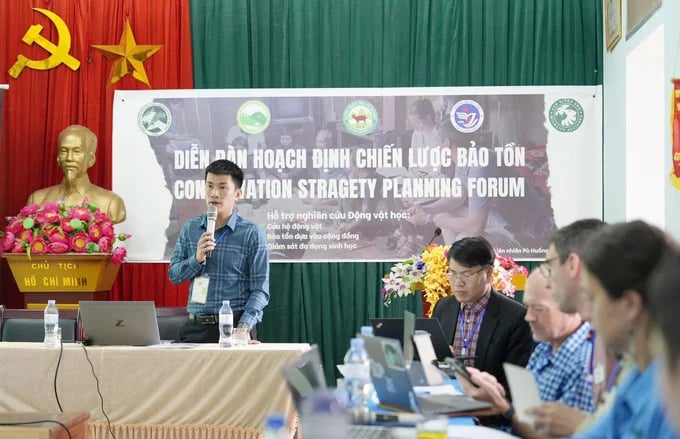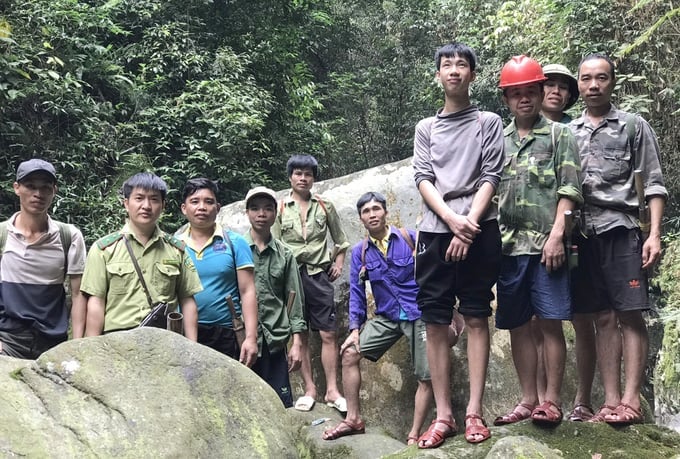October 27, 2025 | 07:43 GMT +7
October 27, 2025 | 07:43 GMT +7
Hotline: 0913.378.918
October 27, 2025 | 07:43 GMT +7
Hotline: 0913.378.918

"Conservation Strategy Planning Forum" aims at a long-term strategy to restore and develop wildlife populations in the Truong Son range ecological area. Photo: Pu Huong Nature Reserve.
From March 11 to 14, the Management Board of Pu Huong Nature Reserve organized a "Conservation strategy planning forum" with the participation of members of Pu Huong Nature Reserve, Institute for Ecology and Conservation of Nature (IECN), Institute of Biochemical and Environmental Technology (Vinh University), San Diego Zoo Wildlife Alliance (SDZWA), Vu Quang National Park, Animals Asia and representatives of the local community in the buffer zone of Pu Huong Nature Reserve.
The forum jointly evaluates and reviews the overall situation and proposes key conservation strategies, as well as opportunities to address existing threats to restore wildlife populations in the vast Truong Son range ecological area.
Through discussions at the forum, organizations will strengthen their capacity to carry out conservation planning, using the conservation standards framework. Based on the previous discussions, participants focused on discussing and developing three major strategies that have the potential to be linked together, including: Ecological monitoring activities; rescue, adoption, re-release; and community-based conservation.
The forum received many important comments, focusing on the content and orientation of conservation activities in the region in the coming time.

Community-based conservation is a practical direction. Photo: Pu Huong Nature Reserve.
Closing the forum, Mr Vo Minh Son, Director of the Management Board of Pu Huong Nature Reserve condensed some main issues. At the same time, he emphasized the necessary solutions in the next stage.
The first is to apply the camera trap monitoring model for muntjacs, amphibians, and reptiles in the Pu Huong and Vu Quang areas. Continue to promote monitoring with community participation using appropriate methods such as camera traps and survey routes. Support the construction of models for rescuing, breeding, and releasing amphibians and reptiles in Pu Huong and turtles and small animals in Vu Quang. Develop a strategy to exchange captive individuals in rescue centres with zoos of the San Diego Zoo Wildlife Alliance. Building a community-based conservation model in Pu Huong based on experience from the previous Wildlife Protection Club (a project sponsored by DANIDA). Improve the model and build a sustainable mechanism that is suitable for the current period.
Finally, maintain coordination between units, gradually expanding the number of forum participants to actively support conservation work in general.
Translated by Hoang Duy

(VAN) The Integrated Plant Health Management (IPHM) helps farmers in Quang Ngai increase rice production efficiently and sustainably.

(VAN) Developing low-emission cultivation technology packages, MRV system, strengthening multi-stakeholder cooperation are to realize the goal of low-emission crop production.
/2025/10/23/5928-2-194850_964.jpg)
(VAN) The 'Regenerative cocoa production to support livelihood development in Vietnam' (ReCoPro) project marks an important step toward sustainable cocoa production.

(VAN) Reducing antibiotic dependence in livestock production helps protect public health, enhance food safety, and promote sustainable agricultural development.

(VAN) Experts describe Viet Nam as a 'policy laboratory' within ASEAN, where new agroecological, green finance, and risk-management initiatives are being piloted before wider regional adoption.

(VAN) Limiting rice straw burning and reusing agricultural by-products as materials or fertilizers not only improves soil health but also helps clean the air.

(VAN) ASSET delivers long-term vision and strategy, innovative models, learning networks, policy impact, and measurable environmental benefits.